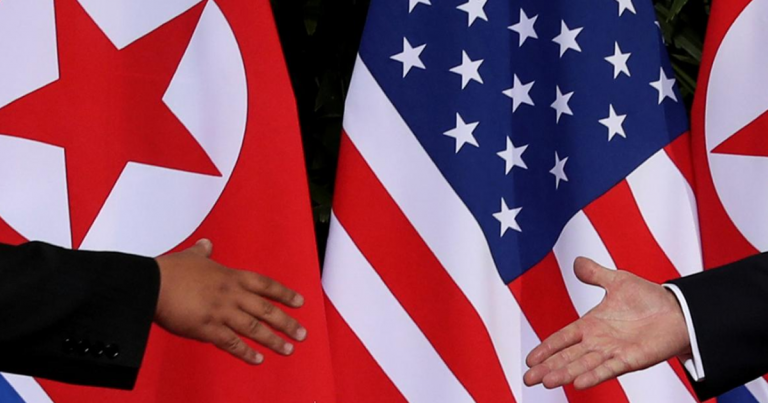
(Reuters) – North Korea said on Sunday there was no way the United States would bring alternative plans for their stalled nuclear talks to a meeting proposed by Stockholm in two weeks after weekend negotiations in Sweden broke down.
The working-level talks between U.S. and North Korean envoys were broken off on Saturday. The U.S. State Department said it had accepted Sweden’s invitation to return for more discussions with Pyongyang in two weeks.
North Korea said the ball was now in Washington’s court, and warned Washington that it would wait only until the end of the year for the United States to change course.
“We have no intention to hold such sickening negotiations as … happened this time (in Sweden) before the U.S. takes a substantial step to make complete and irreversible withdrawal of the hostile policy toward the DPRK,” KCNA state news agency cited a spokesperson for North Korea’s foreign ministry as saying, referring to the official name of North Korea.
Ann Linde, Sweden’s minister for foreign affairs, said the talks had been constructive “for as long as they lasted.”
“Then I think there was a somewhat different view on what to accomplish at one meeting,” she told Sweden’s public broadcaster SVT, adding that Sweden was at the countries’ disposal if they decide to meet again.
“If that is in two weeks or two months remains to be seen. I think it is possible to achieve more talks, but that is entirely up to both parties,” she said.
It is unclear whether North Korea will return to the talks, but Pyongyang could be using its strategy of negotiating on the edge to gain concessions as fringe benefits of participating in negotiations, experts say.
“They want to create the impression that the cause of the impasse is the inflexibility of the U.S. side – and they likely want to force the United States to either come back with a more favorable negotiating position or eventually force President Trump to engage at the summit level to keep diplomacy alive,” said Mintaro Oba, a former U.S. State Department official specializing in the Koreas.
Vipin Narang, a nuclear affairs expert at the Massachusetts Institute of Technology, added that North Korea is also buying time to continue to expand and improve its missile and nuclear force, and negotiate the terms by which it is accepted as a nuclear weapons power.
“If that’s the case, their best strategy is to dangle the hope of a fictional future deal but stall on actual negotiations, let alone crafting or implementing any such deal,” Narang said.
Under sanctions banning much of its trade because of its weapons program, North Korea recently test-fired a new ballistic missile designed for submarine launch, a provocative gesture that also underscored the need for Washington to move quickly to negotiate limits on Pyongyang’s growing arsenal.
DEADLINE COMING CLOSE
North Korea reiterated the year-end deadline that leader Kim Jong Un set for the United States to show more flexibility in the talks, which fell apart in February during his summit with U.S. President Donald Trump.
In June, the two leaders then met again in Panmunjom, the demilitarized zone separating the two Koreas, and agreed to restart working-level talks.
At the working-level talks, the United States has said it brought “creative ideas” and had good discussions with North Korea, without giving further details.
But North Korea’s foreign ministry said Washington had made no preparations for the talks in Sweden but sought only to serve its own political aims.
The North Korean delegation led by chief nuclear negotiator Kim Myong Gil left the embassy in Stockholm, Yonhap News Agency said. Asked whether they would return to Sweden, Kim suggested asking the U.S. side.
The North Korean delegation flew to Moscow on Sunday, apparently going back home via Beijing, according to Yonhap.
A motorcade believed to carry U.S. counterparts also left a Stockholm hotel, Yonhap said.
“The U.S. is spreading a completely ungrounded story that both sides are open to meet after two weeks. … It is not likely at all that it can produce a proposal commensurate to the expectations of the DPRK and to the concerns of the world in just a fortnight,” the foreign ministry spokesperson said.





